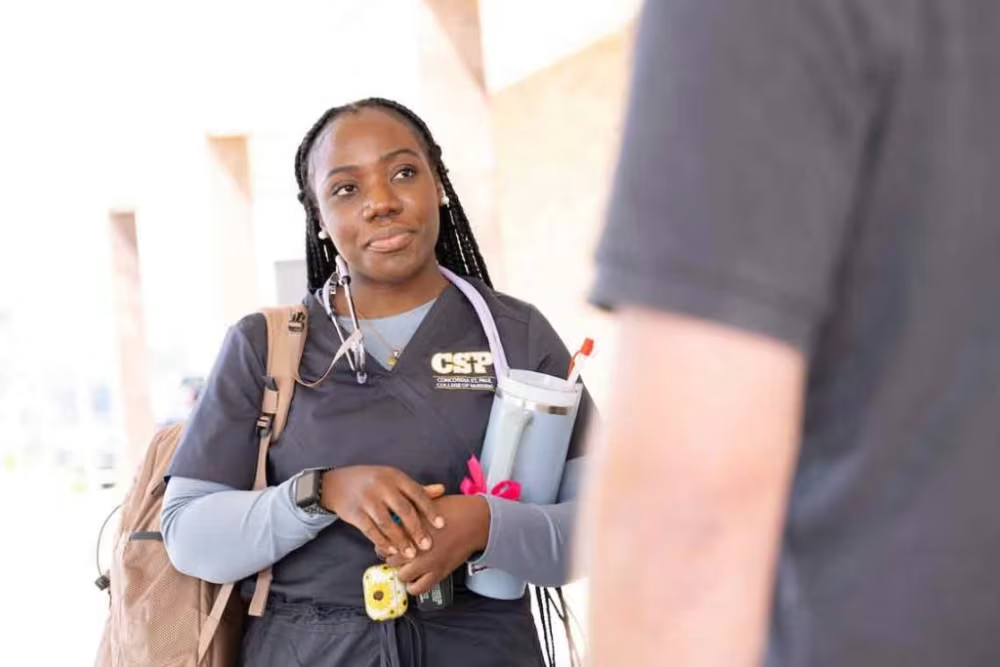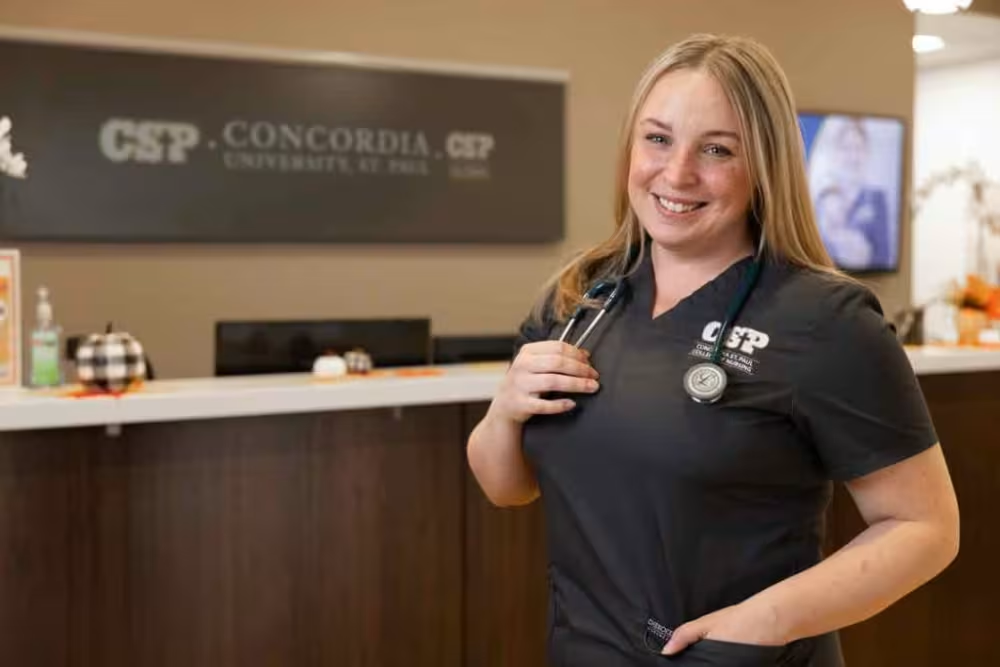How to Get Into Nursing School: Your Complete Guide
Each blog post is dated and contains accurate information as of that date. Certain information may have changed since the blog post publication date. If you would like to confirm the current accuracy of blog information, please visit our ABSN overview page or contact admissions at 866-892-1562.
Wondering how to get into nursing school if you have non-nursing college credits? The nursing school requirements differ from one program to the next but generally include a minimum number of college credits within a grade requirement, prerequisite courses, and possibly an entrance exam.

Enrollment in nursing school programs has been increasing. According to the 2024 Annual Survey by the American Association of Colleges of Nursing, enrollment in Bachelor of Science in Nursing (BSN) programs increased by 4.9% in 2024, representing 12,434 students across 964 nursing schools. Entry to nursing schools is becoming even more competitive among these rising enrollment numbers. Looking into how to get into nursing school is an important first step toward an in-demand nursing career.
Not all nursing programs are the same, and there are varying requirements to get into nursing school. Some students enroll in a four-year BSN degree program after high school. Other options are designed to be completed more quickly. For instance, if you previously earned non-nursing college credits or completed a non-nursing degree, you could enroll in Concordia University, St. Paul’s Accelerated Bachelor of Science in Nursing (ABSN) program.
Our Accelerated BSN program is designed to build on your previous education, allowing you to graduate with a nursing degree in as few as 16 months. We offer three start dates per year at program location sites in St. Paul, Minnesota, and Portland, Oregon.

Curious about the admissions process at CSP Global? Get six tips for applying to nursing school.
As you consider how to get into nursing school, first explore your motivations for becoming a nurse and your options for school. Then, research the nursing school requirements, fulfill them, and apply.
How to Get Into a Nursing Program Q&A
From deciding on a nursing career path to completing the nursing school application process, let’s review each step in the admissions pathway.
Why Do You Want to Be a Nurse?
You probably already know why you want to be a nurse, but telling your story and articulating your reasons are powerful. Being able to explain why you are passionate about becoming a nurse can increase your chances of getting into nursing school.
When you first speak with an admissions advisor, they will ask why you want to be a nurse. Many nursing schools require applicants to submit an admissions essay or attend an in-person admissions interview. While this is not the case with Concordia ABSN admissions, knowing your reason why is important for getting through the rigorous academic nursing program. Having a strong motivation can help you stay driven while balancing life and academics.

What Type of Program Should I Look for?
There are three main ways to become a nurse:
- Earn an Associate Degree in Nursing (ADN).
- Earn a BSN in a traditional program.
- Earn a BSN in an ABSN program.
Since employers prefer to hire BSN-prepared nurses, and because most new nurses entering the workforce have BSN degrees, your career will most likely be more successful if you earn a BSN rather than an ADN. If you lack prior college education, you’ll need to apply to a traditional four-year BSN program. If you have a completed non-nursing degree or a minimum number of college credits, then you may be eligible to apply to an ABSN program.
Where you choose to earn your nursing degree matters; you need to ensure any nursing program you consider is accredited and has an excellent reputation. You should also look at a program’s NCLEX-RN® pass rate. (CSP Global proudly maintains above-average first-time NCLEX pass rates.)
You might also prefer a hybrid program with the convenience and flexibility of online coursework. Knowing your needs and preferences will help you to find the nursing program that is right for you.
Another factor to consider is location. Sometimes, relocating for the right nursing school is the best option, particularly if the nursing schools near you do not offer ABSN programs or have lengthy waiting lists.
Is relocating for nursing school the right choice for you?

What Are the Nursing School Requirements?
Each nursing school has its own admission requirements. The requirements for CSP ABSN students include:
- A completed non-nursing degree or at least 54 college credits
- Cumulative GPA of 3.0 or higher
- Minimum 3.0 GPA in all science prerequisites, combined
- 65% or higher on the ATI Test of Essential Academic Skills (TEAS)
- Letter grade of C or better in all prerequisites
- English language proficiency, if applicable
Your Concordia ABSN admissions advisor will help you navigate this process. They will review your academic history and explore elements like prerequisites. Your advisor can also ensure your application package is complete before you submit it.
How Can an Admissions Advisor Help With My Application?
When you first call CSP Global, you will be assigned a dedicated admissions advisor to guide you through the admissions process. Your advisor will answer your questions and help you determine if the ABSN program is right for you.
Knowing your cumulative GPA and how many college credits you have completed going into your nursing school search can save you the time of applying to a program for which you aren’t eligible. Don’t despair if your GPA is slightly below the minimum requirement, however.
In some cases, simply retaking a course or fulfilling prerequisite courses may be enough to raise your GPA. When you talk to an admissions advisor, they will help weigh your options and make recommendations on improving your chances of meeting the requirements for nursing school.

Are There ABSN Program Prerequisites?
Accelerated nursing programs allow you to earn your BSN degree more quickly by leveraging your past college credits, but you may still need to take a few prerequisite courses. These include science classes like microbiology, developmental psychology, and human anatomy and physiology.
While other requirements vary from program to program, many programs require you to obtain a Basic Life Support (BLS) certification. Your admissions advisor will help you devise a plan for tackling any outstanding requirements.
Once you’ve fulfilled these requirements, you’ll be ready to submit your application package. Be sure to check in with your advisor first, as they will help ensure your application isn’t missing any important documentation. Then, submit your completed application via the online portal.
How Do I Pay for Nursing School?
The next step is to decide how to pay for nursing school, if you haven’t already. In addition to tuition, you’ll need to pay for insurance, student fees, test assessments, books, uniforms, and lab supplies, as well as your living expenses.
Your admissions advisor at Concordia University, St. Paul can help you learn about financial aid options, such as our school’s scholarship offerings. You should also fill out the Free Application for Federal Student Aid (FAFSA) to determine your eligibility for federal student aid, and you should look for private scholarships.

Why Pursue a BSN Degree With CSP Global?
With a better understanding of how to get into a nursing program, it’s time to get started. Finding a program that supports you and allows you to get started as soon as possible is important. CSP’s admissions advisors are committed to supporting your success from day one. Here, you can graduate in as few as 16 months and be ready to take the licensing exam and apply to your first nursing job. With our comprehensive curriculum and applied clinical learning experiences, you’ll be ready to tackle modern challenges in nursing.
Learn more about our ABSN program and determine the next steps to take by contacting an admissions advisor at CSP Global today.
